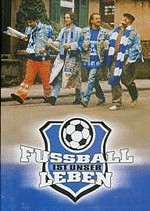Take a combination of Nick Hornby's book Fever Pitch and British film megahit The Full Monty, set it in a working class area of the German Ruhr area, and you pretty much have Tomy Wigand's Fußball ist unser Leben (Soccer Rules, 1999). All that's lacking really is the striptease.
This affectionate, highly amusing, but slightly predictable story of a bunch of football-obsessed middle-aged men is above all a showcase for the prodigious comic acting talents of Uwe Oxenknecht. This is his film and it is some performance. Whether he's rolling his eyes, pulling faces, engaging in ridiculous pratfalls, Oxenknecht never fails to imbue his boorish, unappealing loser of a character, with an endearing sincerity that has the audience willing him to succeed in the face of so much self-inflicted adversity.
Oxenknecht plays Hans Pollack who, with his mates Mike, Berni and Theo, is completely obsessed with the fortunes of their team, Schalke 04. They won't hear a word against them, in spite of regular losses on the pitch, and are particularly loyal to the team's overseas star, known as Dios.
Rash bet
Hans, meanwhile, has been given two weeks by his mortgage-lender to find a job or he loses his house. Having lost his last job due to his overbearing Schalke obsession Hans' prospects look bleak. In a rash moment of bravado amongst his football friends he bets the house on Dios scoring a goal in his next game.
By chance Hans and his chums discover that Dios has a coke habit and wants to leave Schalke for Inter Milan. This appals them but that same evening, Hans, by now working as a taxi driver but completely drunk, ends up with Dios in his cab and abducts him almost by accident. Waking up the next morning he suddenly realises that he has Dios locked in his cellar but he decides that he will drum some fighting Schalke spirit into the dilettante star.
From there it all goes downhill rapidly for Hans. His wife finds out about his reckless bet and promptly leaves him, taking the children with her. Dios tries repeatedly to escape and Hans loses the support of his friends. Then his mother dies and Hans decides to give up on his rehabilitation of Dios.
Shared ruin
But by now Hans is not alone in his misfortune. Dios' girlfriend has taken off with his manager and the contract with Inter Milan has fallen through. Misadventure drives the two hapless men together and before long we are hurtling to an upbeat resolution of their situation with lessons learned on all sides.
If this sounds trite, the experienced hand of director Tomy Wigand stops it from cloying. This is a charming film without ever reaching the heights of great movie making and it would work just as well on television. The evocation of football supporter life is excellent and even if you have no interest in the sport, you end up rooting for all the characters as they struggle through.
Oxenknecht is simply superb and is thankfully rarely off screen. But this is not to denigrate the supporting task, with Tana Schanzara putting in an especially funny cameo as Hans' mother - part sweet old lady, part perpetual thorn in Hans' side, supporting, as she does, Schalke's great rivals, Borussia Dortmund.
It all feels a little like a story you may have heard before, but this time it's told so well you won't want to leave the game early. This is a great opportunity to see Oxenknecht at the top of his form. He's a great actor, deserving greater recognition.
Elke de Wit, 8 May 2000
Anne Høegh Krohn's Fremde Freundin |
Egon Günther's Die Braut |
Rolf Schübel's Ein Lied von Liebe und Tod |
Pepe Danquart's Heimspiel |
Rosa von Praunheim's Der Einstein des Sex |
Andreas Kleinert's Wege in die Nacht |
Veit Helmer's Tuvalu |
Sebastian Schipper's Absolute Giganten |
Frieder Schlaich's Otomo |
Bernd Eichinger's Der Große Bagarozy |
Thorsten Schmidt's Schnee In Der Neujahrsnacht |
Doris Dörrie's Erleuchtung Garantiert |
Leander Haußmann's Sonnenallee |
Maren-Kea Freese's Zoe |
Click here for the Berlinale website |
Moving on:
- Return to the CER front page
- For more articles on Central and East European film see the Kinoeye Archive



